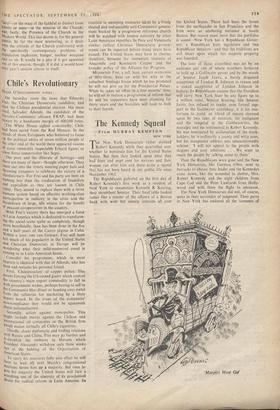Chile's Revolutionary
HUGH CrSHAUGHNESSY writes :
On Saturday came the news that Eduardo Prei, the Christian Democratic candidate, had Won the Chilean presidential election. His main rival, Salvador Allende, the candidate of the Socialist Communist alliance FRAP, had been beaten by a handsome margin of 400,000 votes.
The White House sighed contentedly; Chile had been saved from the Red Menace. In the Minds of those Europeans who bothered to focus on the political antics of seven million people at the other end of the world there appeared visions of some eminently respectable Erhard figure, or some fierce conservative like Segni.
The poor and the illiterate of Santiago—and there are many of them—thought otherwise. They came out into the streets wearing paper hats and throwing streamers to celebrate the victory of a revolutionary. For Frei and his party are bent on nothing less than the eradication of feudalism and capitalism as they are known in Chile today. They intend to replace them with a more humane system based on effective working-class Participation in industry in the cities and' the breakdown of large, idle estates for the benefit of peasant co-operatives in the country.
With Frei's victory there has emerged a force in Latin America which is dedicated to transform- ing the social scene quite as completely, though rnore beneficially, than has been done in the five and a half years of the Castro regime in Cuba. Within a year, one can fOrecast, Frei will have lost much of his popularity in the United States and Christian Democrats in Europe will 33e Wondering what their mild-mannered creed is Coming to in Latin American hands.
Consider his programme, which in most respects is identical with that of Allende, who has been and remains his personal friend.
First, Chileanisation' of copper policy. This ineans forcing the US-owned giants which control the country's main export commodity to fall in With government wishes, perhaps having to sell to the Communist bloc direct or handing over metal from the refineries for marketing by a State export board. In the event of the companies' non-compliance they would not be squeamish about nationalisation.
Secondly, action against monopolies. This
ight include moves against the Chilean and international oil companies or the British firm Which makes virtually all Chile's cigarettes.
Thirdly, closer diplomatic and trading relations With Russia and China. Frei may go further and re-establish the embassy in Havana which President Alessandri withdrew only three weeks 4,go at the bidding of the Organisation of American States.
To carry his measures fully into effect he will have to wait till next March's congressional elections throw him up a majority. But once he gets his majority the United States will face a searching test of the sincerity of its proclaimed desire for radical reform in Latin America. Its
reaction to sweeping measures taken by a freely elected and indisputably anti-Communist govern- ment backed by a progressive reformist church will be watched with intense curiosity by other Latin American republics. In Peru and Venezuela similar radical Christian Democratic govern- ments can be expected before many years have passed. The United States may have to choose, therefore, between the immediate interests of Anaconda and Kennecott Copper and the broader policy of the Alliance for Progress.
Meanwhile Frei, a tall, lean, austere economist of 'fifty-three, lives on with his wife in the suburban Santiago house which he has promised he will not give up for the Presidential Palace. When he takes up office in a few months' time, he will set in motion a programme of reform that he and his supporters have been planning for thirty years and the Socialists will have to look to their laurels.






























 Previous page
Previous page